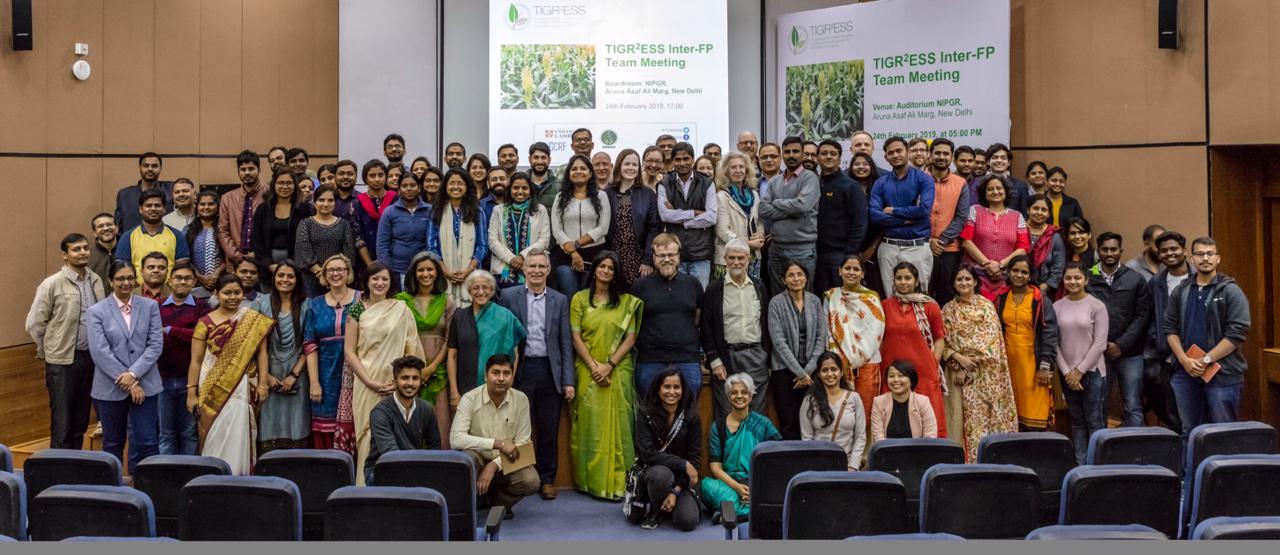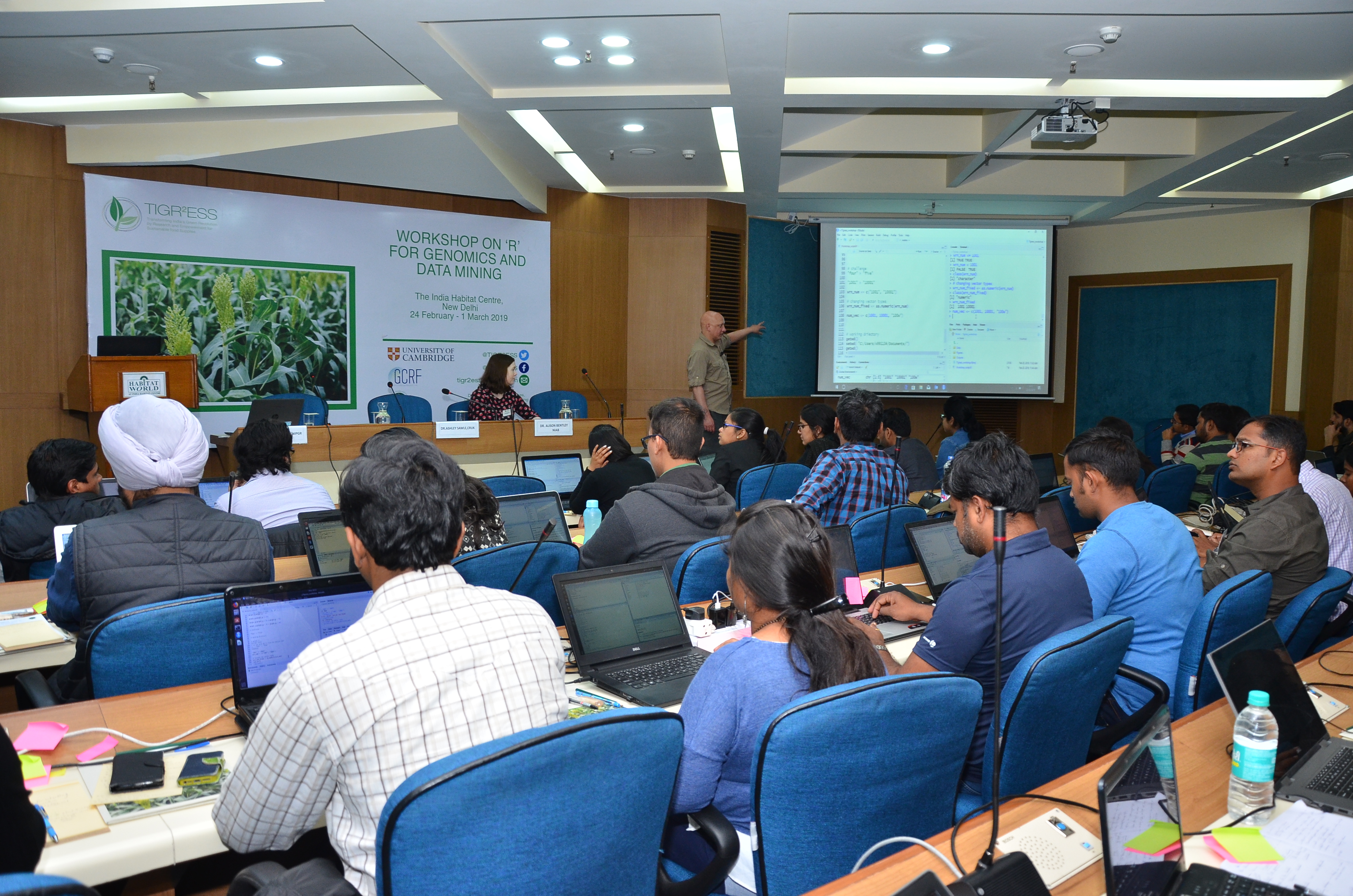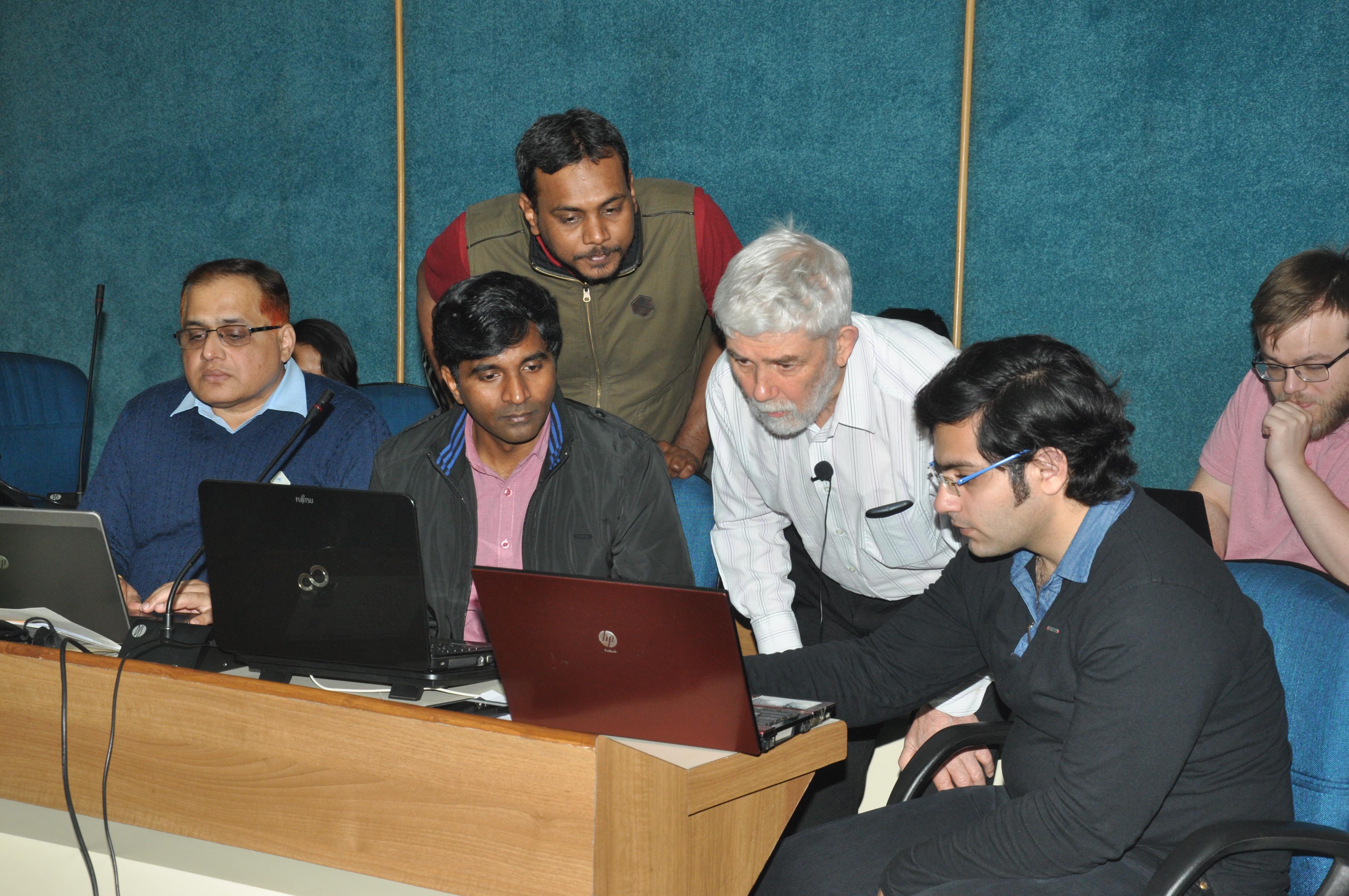Submitted by Sarah Bailey on Thu, 28/03/2019 - 15:51
Two TIGR2ESS Flagship Programmes looking at Water Use and Photosynthesis and Heat and Drought Resilience in Wheat, recently joined forces to deliver an intensive hands-on training workshop for 50 early career researchers working on a range of plant and crop science projects. The workshop, held at the India Habitat Centre, New Delhi from 24 February to 1 March, 2019, aimed to increase confidence in the use of the powerful, open source software package R as well as in text- and data-mining using ContentMine.
Delegates at the beginning of the workshop
The workshop started with an evening of welcomes, giving delegates an opportunity to meet each other and the organisers, and to find out more about the interdisciplinary research of the TIGR2ESS programme from its principal investigators. Over 100 researchers applied to attend and those selected included TIGR2ESS partners NIPGR, ICRISAT, The University of Essex and Punjab Agricultural University, as well as early career researchers from other institutes and universities in India working on addressing crop science challenges.
An intro to R and RStudio
Once formalities were over, training began in earnest the next morning, with an enthusiastic and engaging Ashley Sawle introducing participants to RStudio. After just a few hours everyone was settling into the basics and the challenges started getting harder - syntax in R is sometimes a little complex!
Next, the fun bit - some data wrangling. Delegates really challenged themselves to learn more than just the scripts presented to them. There were many questions and live iterations of the code, making for a dynamic and engaging atmosphere.
After two days of getting to grips with R, the remainder of the workshop focused on applying specific packages to the analysis of crop datasets – a must for crop scientists. A full day of training covered Karl Broman’s excellent R/QTL software for generating genetic maps and mapping quantitative trait loci (QTL) and Endelman Group’s GWASpoly for genome-wide association studies (GWAS). As before, participants were determined to push both software tools to their limit and to understand how they could use them for their projects and populations.
Further insight into the many excellent open resources now available for crop scientists came from Sigrid Heuer (Rothamsted Research, UK), who focused on software for genes, including EnsemblPlants. Rakesh Srivastava from ICRISAT then spoke about how his group is using QTL and gene information to drive genetic improvements in their millet breeding programme.
Ashley Sawle introduces delegates to R and RStudio
Grant writing and career development
No workshop for early career researchers would be complete without a session on grant writing and career development. On day five Dr Savita Ayyar, founder of Jaquaranda Tree, an independent consultancy that supports organisations and early career researchers with research management, led the session.
Savita discussed some of the less obvious advantages of writing a grant, such as receiving feedback from the scientific community. She gave good practical advice about the different kinds of grants available to early career researchers, in particular national and international funding for Indian researchers, and provided an overview of the steps involved, from selecting the correct funding opportunity, to writing the proposal, and completing the all-important paperwork and permissions.
Next, participants heard about the range of career options available to them - there is more than academia to consider. Researchers forge careers at funding agencies, publishers and in industry, or move into science communication and outreach, management or policy. The session ended with Savita, along with TIGR2ESS programme managers Rose Eichenberger and Dr Aakriti Wanchoo, describing their own career paths, having each made the leap from academia into research management.
Utilising scientific literature
The sixth and final day of the workshop covered a very important practice for any researcher – extracting information from published scientific literature. With help from volunteer students Vinita Mehlawat and Ambarish Kumar, both working at NIPGR, course tutor Peter Murray-Rust introduced the ContentMine open source software as well as WikiMedia, EuropePMC, Etherpad and GitHub. Peter was impressed with the level of preparation that went into making the training a success.
"Our preparation was wonderful. We ran 1-2 hour hangouts each day for a month, with three keen early career researchers in Delhi preparing and revising material. Vinita, Ami and Ambarish deserve great credit for ensuring the workshop had rigour and excitement. We would love to rerun this, perhaps in different locations or involving different crops and organisations.”
The final morning session on mining the literature for crop-related data was very exciting and the trainers were impressed with the energy, commitment and skill of the delegates. Participants learnt how to perform structured literature searches using examples of millets, basil, phytochemistry and horticulture.
Peter Murray-Rust supports a group with their data mining project
Delegates were split into groups to perform small literature surveys on their own preferred topics. After just one hour of work, each group gave pitch talks to present their findings. Peter has run many workshops and hackathons and he felt this was probably the best ever.
“We gave participants just four hours to learn the tools and then use these tools to come up with multifactorial understanding. The presentations were great – there was a very collaborative atmosphere.”
The topics team covered were incredibly diverse, ranging from crop stress all the way through to biofuels in Jatropha. One of the teams, Tigers of TIGR2ESS, showed that an analysis of "drought" highlighted the role of the enzyme dehydrogenase, a finding that was new to a number of delegates. Having the ability to identify correlations like this will be invaluable in initial scoping of projects. Gitanjali and Peter helped each team understand the software and supported them in exploring their projects further.
A resounding success
Feedback from delegates was hugely complimentary and it’s clear that the workshop has inspired everyone who attended to apply their new-found knowledge to their future research. The organisers hope to run a similar workshop later this year, to advance knowledge exchange and strengthen capacity in genomics and data mining in India.
“...I attended this workshop to strengthen my skills in genomics using R and found it will be useful for me in future research plans. The trainers were so professional and the teaching methods were excellent.” Md Iqbal Raja Khan (Assistant Professor, Jamia Hamdard University, India)
“This workshop has been my first experience of using R and I am very happy to have learnt so many essential details in such [a] short time. I have now vowed to give up data analysis on spreadsheets in favour of R!” Faizan (Post-doctoral fellow, ICGEB, India)
The workshop was organised by Gitanjali Yadav (National Institute of Plant Genome Research (NIPGR) India & University of Cambridge, UK) and Alison Bentley (NIAB, UK) along with course tutors Ashley Sawle (Cancer Research UK, Cambridge Institute, UK) and Dr Peter Murray-Rust (ContentMine, University of Cambridge, UK). Workshop participants represented TIGR2ESS partners, including NIPGR, ICRISAT, The University of Essex and Punjab Agricultural University, as well as early career researchers from other institutes and universities in India working on addressing crop science challenges.
This article was adapted from an internal summary written by Dr Alison Bentley, Dr Gitanjali Yadav and Dr Aakriti Wanchoo.



